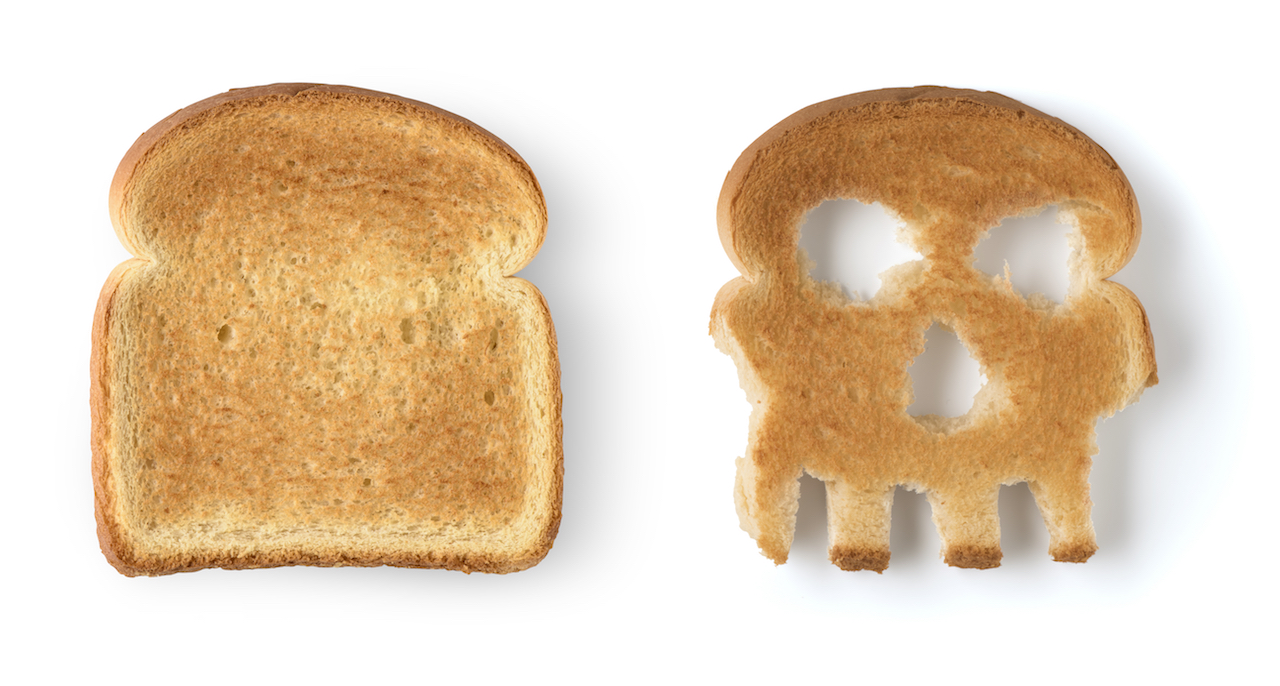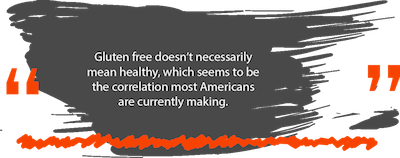
What’s the Big Deal About Gluten?
Feb 14, 2018 mindpumpGluten is the proteins found mainly in the grains wheat, barley, and rye. It’s currently a hot topic in America. There seem to be two very divided camps on the topic:
Camp 1 says: Gluten is the devil, the root of all health issues.
Camp 2 says: Only hippies go gluten-free, beer and bread for me!
Is Gluten Really EVIL?

There is LOTS of reasoning behind the anti-gluten camp.
The most severe form of gluten sensitivity is celiac disease. According the celiac disease Foundation: “When people with celiac disease eat gluten, their body mounts an immune response that attacks the small intestine. These attacks lead to damage on the villi, small fingerlike projections that line the small intestine, that promote nutrient absorption. When the villi get damaged, nutrients cannot be absorbed properly into the body.” (1)
Celiac disease has MANY symptoms, including: anxiety, bloating and gas, constipation, depression, diarrhea, itchy skin, joint pain, and many more. (4) (For more symptoms: https://celiac.org/celiac-disease/understanding-celiac-disease-2/celiacdiseasesymptoms/ )
Obviously celiac disease is a very serious issue. HOWEVER, only about 1% of the U.S. population suffers from it. (2) So why is EVERYONE freaking out about gluten?
Gluten Sensitivity

Although not as serious as celiac disease, gluten sensitivity is still a VERY REAL, albeit a bit blurry, issue.
Gluten sensitivity can have similar symptoms to celiac disease like: brain fog, depression, , abdominal pain, bloating, diarrhea, constipation, headaches, bone or joint pain, and chronic fatigue (when self-diagnosing, be aware that many things OTHER than gluten can also be causing similar symptoms). However, those possibly suffering from gluten sensitivity will NOT experience the intestinal damage as someone with celiacs. According to BeyondCeliac.org “Gluten sensitivity does not result in the increased intestinal permeability that is characteristic of celiac disease. Increased intestinal permeability permits toxins, bacteria and undigested food proteins to seep through the GI barrier and into the bloodstream…” (3)
Research is very inconclusive on the exact cause of gluten sensitivity. It’s possible that other proteins in gluten containing grains could be playing a factor, making the resulting issues not entirely glutens fault. FODMAPs, a group of carbohydrates that are poorly digested by the small intestine, could be responsible for the symptoms. Consumption of FODMAPs can cause: gassiness, bloating, constipation, and/or diarrhea. The gluten containing grains wheat, barley, and rye are all high in FODMAPs, which can make distinguishing what’s really causing the issue, gluten or FODMAPs, a bit difficult.
So, if you feel that you have issues with gluten, but don’t have celiac’s, your issue could very well be FODMAPs, not specifically gluten. Despite the somewhat blurry relationship between gluten and FODMAPs, it’s clear that a diet that eliminates gluten, or at least grain, can be beneficial for some.
Should I Go Gluten-Free?

Potentially, IF: If you’ve been experiencing symptoms like bloating, gassiness, and diarrhea, especially after eating foods high in gluten. If you believe you are suffering from celiac disease, most definitely see a physician for a diagnosis. Gluten sensitivity cannot be tested for, the gluten free diet is the only way to “diagnose” it.
No, IF: You’re doing it to lose weight. Eliminating gluten is NOT AN EFFECTIVE WEIGHT LOSS STRATEGY.
Many products that are high in sugar and very processed do contain gluten, so cutting those out of your diet and replacing them with more fruits and vegetables will definitely make you feel better, less bloated, etc. Just be aware that gluten-free products can also be less nutritious than their whole grain counterparts. Many gluten free foods are still awful for you.

Feel free to try to decrease processed, refined grains in your diet. However, for the average person who is not gluten intolerant, moderate amounts of whole grains, including those with gluten can be very healthy and beneficial. Many people handle gluten just fine, and see no issues from it. In this case, there’s no need to eliminate it if you don’t want to.
REMEMBER: Gluten free doesn’t necessarily mean healthy, which seems to be the correlation most Americans are currently making.
Sources:
(1) https://celiac.org/celiac-disease/understanding-celiac-disease-2/what-is-celiac-disease/
(2) https://www.ncbi.nlm.nih.gov/pubmed/22850429
(3) https://www.beyondceliac.org/celiac-disease/non-celiac-gluten-sensitivity/what-is-it/







